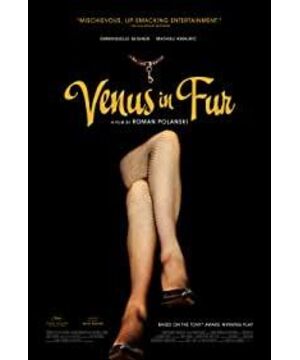This is Polanski's Confession; Polanski's Revenge of the Goddess. This goddess is his wife who is 33 years younger than him, and is also the female lead in "Bitter Moon".
Venus in Furs is a cautionary tale for BDSM lovers.
To those who secretly harbored the feelings of the original author, Masoch, the lines of the stage play were like confessions. I really liked the Wanda and Salinger dialogue in the in-scenario, it totally showed the mentality of the sub in my BDSM relationship. A dom once told me that some subs are in relationships "not for love, but for unethical thrills", and I disagree. The DS relationship in my mind contains something similar to but higher than love - the "Principle of Glory":
-What is your heart's greatest desire?
- Be yours, stay with your sublime nature. Dress you, change your clothes, put your stockings on, put your shoes on. Your will is my will.
- you call this love?
- This is the only kind of love, just like politics, only one party can be in power. One is a hammer and the other is a cutting board. I would like to be the chopping block between us.
- Wanda. I seek pain, you seek pleasure. Don't be manipulated by anyone's emotions. Enjoy your lover as he enjoys you. Dominate him, oppress him. If you can't make me your husband, make me your slave. Torture me with holy brutality.
It is this magic that drives the film forward, the ups and downs and the game between Wanda and Thomas. It was a deeply emotional relationship, as Thomas said, and he was fascinated by it.
Polanski is fascinated by portraying people who seek redemption in lust, and are ultimately punished and lost by lust.
Wanda is absolutely right. Whether it's a stage play or a movie, in the end it's just the obscenity of the male director. I don't think he found a way out.
Polanski's achievements in film structure are worth a book: the two actors complete the entire film in dialogue in only one space of the theater, and the rhythm of the whole film is exquisitely controlled and complete. Compared with Linklater's love in the trilogy, Polanski's peculiarity is that, first, the male and female protagonists are not in love, they are both the interviewer and the interviewee-Thomas as the interviewer and director is intellectual With the high position of power - and at the same time Venus and her slave, Wanda, as Venus, is in a high position of sexual tension. As the film progresses, Thomas is repeatedly understood and matched by Wanda's role. Shocked, Wanda seems to have gradually achieved a high position in intelligence and power under the brilliance of the "Principle of Glory". What Polanski achieves through the hero and heroine is multiple narratives. Second, the male and female protagonists are always in the same fixed space (theatre), and Polanski has almost completely abandoned the possible blessing of the beauty of the lens to the film. The only change in the film is the stage lighting adjusted by Wanda. This makes the stage play of the film more intense, requiring more drama, lines and performers.
Polanski is not like Quentin in his singular innovation of lenses and pictures, nor is Linklater's rich, sharp and complex language to build a contagious and beautiful atmosphere; Polanski makes the audience see the cold reality of experience Ordinary people who are tormented by their own passions. Or rather, Polanski is trying to show how, in a modern, grim and barbaric for the artist—including the failed Parisian writer over forty in "Bitter Moon", and in this film, preparing and writing sociology papers, raising A stage director married to a wealthy girl named Derrida's dog, whose circumstances were not very good, couldn't help but complain about the "era of deep emotion lacking" - how lust plays deceitfully The way of salvation for those sentimental people, and how these sentimental people, the idols they made for their lovers, fell off the altar.
"Venus in Furs" and Polanski's "Bitter Moon," shot more than a decade ago, both feature the same woman, Emmanuelle Seigner. Seigner is Polanski's wife, thirty-three years younger than Polanski. After more than ten years, she is much older, but her role is still radiant, representing borderline eroticism and derailed passion; Rose and Wanda are both inferior in social status, but in love. , they were all naked Venus in fur, full of domination. Perhaps this is a hint that the woman in this setting is more to Polanski's taste than Salinger's original.
View more about Venus in Fur reviews









